Ana Neves: Profiles in Knowledge

This is the 118th article in the Profiles in Knowledge series featuring thought leaders in knowledge management. Ana Neves, based in Lisbon, Portugal, is the founder and managing director of Knowman (a consulting company focused on knowledge management and enterprise social networks), host of The Intranet Hub, author and host of the KMOL portal, and organizer of the Social Now conference. She is the coauthor of the Social Collaboration Maturity Benchmark and author of the biannual study on Knowledge Management in Portugal and Spain. Her specialties are knowledge management, communities of practice, organizational learning, social networks, social tools, internal communication, and cultural change management.
She was a Senior Consultant at a social business consultancy firm; Knowledge Network Manager at the NHS Modernization Agency and the Institute for Innovation and Development, both part of the British Department of Health; and Cultural Change Manager at a financial institution, leading a cultural change program for a team of 4000+ people.
In 2008, 2010 and 2011 Ana was president of the jury of the Prêmio Intranet Portal, an award that recognizes the best intranet in public and private organizations in Brazil. In 2001 she created KMOL, a Portuguese-language site dedicated to knowledge management and organizational learning.
Ana is an honorary member of the Directive Commission of the Federación Iberoamericana de Comunicación Interna (FIDECI). She has a Licenciatura (5-year Bachelor’s) degree in Computer Science from the University of Coimbra.
Through Knowman, Ana shares her experience, skills and passion with organizations looking at knowledge management, social networks, and social tools to increase their performance. She is the host of the KMOL podcast, the first Portuguese-language podcast dedicated to KM and organizational learning. Ana organizes Social Now, a unique conference on the social organization, exploring both tools and processes to improve the way organizations communicate, collaborate, learn, and share knowledge. She is responsible for Cidadania 2.0, a platform to promote examples of social tools being used to improve dialogue and civic participation.
Background EducationUniversidade de Coimbra — Licenciatura, Informatics Engineering / Computer Science, 1993–1998ExperienceKnowman — Owner and Management Consultant, 2001 — PresentStraits Knowledge — Associate Consultant, 2017 — PresentHeadshift (UK) — Senior Social Software Consultant, 2006–2009NHS Institute for Innovation and Improvement — Knowledge Management Associate, 2005–2006NHS Modernisation Agency — Knowledge Network Manager, 2002–2005Abbey National — Cultural Change Manager. 2001–2002Unisys — Consultant, 1998–2001ProfilesLinkedInKnowman — LinkedInFacebookKnowmanKMOLKMOL — FacebookSHIFT/WorkTICTeCLucidea’s LensContentSocial NowLinkedIn PostsKnowman: Knowledge, Collaboration and CommunicationNetwork ActivationNewsKMOL: Knowledge Management and Organizational LearningArticlesInterviewsBooksCasesBlogKMOL ArchiveMediumQuoraFlickrThe Intranet Hub
EducationUniversidade de Coimbra — Licenciatura, Informatics Engineering / Computer Science, 1993–1998ExperienceKnowman — Owner and Management Consultant, 2001 — PresentStraits Knowledge — Associate Consultant, 2017 — PresentHeadshift (UK) — Senior Social Software Consultant, 2006–2009NHS Institute for Innovation and Improvement — Knowledge Management Associate, 2005–2006NHS Modernisation Agency — Knowledge Network Manager, 2002–2005Abbey National — Cultural Change Manager. 2001–2002Unisys — Consultant, 1998–2001ProfilesLinkedInKnowman — LinkedInFacebookKnowmanKMOLKMOL — FacebookSHIFT/WorkTICTeCLucidea’s LensContentSocial NowLinkedIn PostsKnowman: Knowledge, Collaboration and CommunicationNetwork ActivationNewsKMOL: Knowledge Management and Organizational LearningArticlesInterviewsBooksCasesBlogKMOL ArchiveMediumQuoraFlickrThe Intranet HubA safe space for member organizations to share, view, learn, mix, and adapt from each other’s intranets.
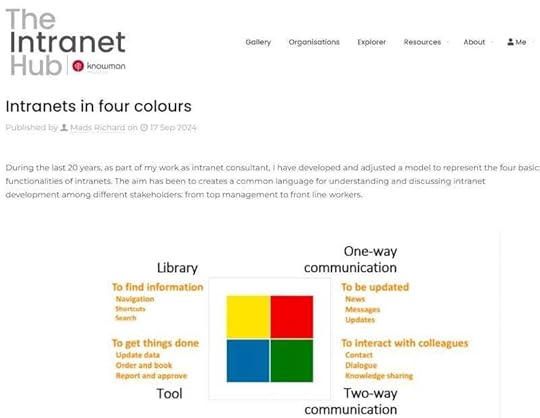 NewslettersLinkedIn — Friday Suggestions” “Things” I discover, like, or criticize, and want to share with you. Knowledge management, intranets, and the likeKMOLArticlesGestão do Conhecimento em Portugal (Knowledge Management in Portugal)The thinking behind the Knowledge Sharing Canvas design — Elium
NewslettersLinkedIn — Friday Suggestions” “Things” I discover, like, or criticize, and want to share with you. Knowledge management, intranets, and the likeKMOLArticlesGestão do Conhecimento em Portugal (Knowledge Management in Portugal)The thinking behind the Knowledge Sharing Canvas design — EliumInterviews (in Portuguese: use Google Translate to read in English) *denotes individuals I have previously profiled
Stan Garfield* (example of what Google Translate produces)Eugenio MoliníCai KjaerSumeet Gayathri MoghePatricia De Sá FreireHank MalikPaul BurnsStuart TownsendCristian SalantiCéline Schillinger*Susan Hanley*Bonnie CheukJane Mcconnell*Victoria Ward*Miguel Pina E CunhaRachel Happe*Alejandro FormanchukEdwin K. MorrisJoão BaptistaPaulo Nunes De AbreuHarold Jarche*Daria VodopianovaPaulo De CarvalhoTiago CaldasJerônimo LimaArthur Shelley*David Gurteen*Eric LynnPatrick Lambe*António AlvarengaRaphaël BrinerOscar BergLee ProvoostAlvaro CaballeroPaul Corney*Lee BryantHeitor José PereiraTheodore ZeldinRicardo SaldanhaLuis Suarez*Juliana Vale MarquesAna Neves* by Sérgio StorchEuan Semple*Roger SchankJosé António Henriques DinisSteve BorgattiNick Milton*Victor Newman (2)Geoff ParcellElizabeth Lank*Rodrigo MagalhãesKeith De La RueHubert Saint-Onge*Art Kleiner (2)Jorge Nascimento RodriguesDavid Snowden*Margaret HainesJosé Cláudio C TerraSusanne JustesenCarol Kinsey GomanPeter WestSteve BarthNancy White*Ricardo Vidigal Da SilvaVictor Newman (1)Art Kleiner (1)Thomas Stewart*Paulo Zagalo E MeloHarrison OwenPaulo N FigueiredoJosé Manuel CanavarroWendi Bukowitz E Ruth WilliamsRobert Buckman*Jessica Lipnack*Amy Jo KimEtienne Wenger-Trayner*Mark McElroyVerna Allee*What is knowledge management?Ten interviews with Portuguese-speaking KM professionals showed that knowledge management is seen and implemented very much according to the person in charge and the focus and maturity of the organization. Perhaps it would make sense to have a single definition of knowledge management. At the same time, if we can adapt our approach to knowledge management according to the organization’s pains, priorities, culture, and maturity, we may get more traction for our efforts and, consequently, better results.
Read these ten definitions and perspectives. Think about which ones might make the most sense in your organization, challenge yourself to discover angles you’re not yet exploring, and identify interesting arguments to use. If your activity is related to knowledge management or if you would like to find arguments to improve knowledge management in your organization, do yourself a favor and go listen to the ten interviews. Believe me, you won’t regret it!
Data to Knowledge to Innovation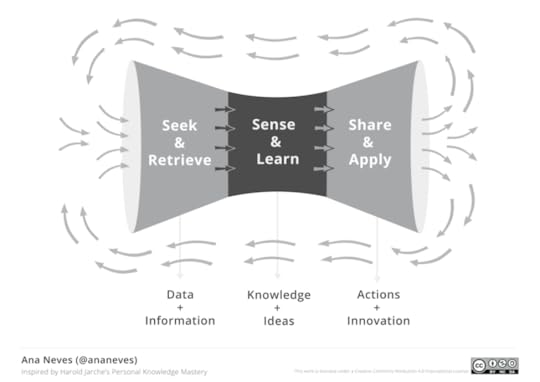
Willingly or not, an organization is constantly producing and receiving data from internal and external sources. In turn, information may be sourced or produced by analyzing available data. Data and information are key. Organizations ought to be aware of the data and information they have and need.
Organizations should then:
Identify and characterize their existing sources — for instance, if they are dependable, their associated costs, and the impact of losing them.Understand who uses the available data and information and whether it could be used by other parts of the organization.Assess the impact of not having the data and information they need.Identify ways of sourcing the data and information required.Based on this assessment the organization can go on to procure what is missing, manage what is available, and explore that available data and information for business gains (efficiency, market, etc.). The model depicts additional aspects of the data-knowledge-innovation relationship:
Making sense of data and information will generate learning and, consequently, the creation of knowledge.New ideas emerge from knowledge, especially from knowledge in the interception of different knowledge domains.New ideas are evaluated and implemented according to existing knowledge, data and information.Innovation is the successful implementation of new ideas and, hence, one way of applying knowledge.The product of innovation is both a way of sharing knowledge and a new source of data and information that feeds back into the organization.Knowledge may be used to create actionable insights which then lead to actions.Sharing and applying knowledge, in the shape of actions or innovation, creates value for the organization and its stakeholders.Why Social Tools are Like Sauces
I love sauces. Sauces are great. People usually love sauces. Ketchup, mayo, soy, white, vinaigrette, etc. Some interesting facts about sauces:
they complement and enhance food’s flavorwe don’t really have sauce on its ownnot every sauce goes well with every mealunless you are a food specialist, you know if a sauce tastes nice with your meal but you would not know which sauce to choose to go with it (color, consistency, flavor-wise).Now that I have said this, and bearing in mind the title of this post, you have probably guessed where I am going with this 😊. Yes, I do think that these facts also apply to social tools (in the enterprise). Let’s consider one at a time.
Social tools can complement and enhance organizational processes. Identifying a colleague who has worked on a similar project as mine, becomes easier. Integrating new colleagues may be quicker and become a more pleasant experience for all involved. Despite that, having a tool without associated processes and practices means nothing. We do not buy tools for the sake of buying tools. We buy tools because we expect them to improve the way we work.
Not all social tools are appropriate for all organizations. As I usually say, find a tool that can stretch your organization in the direction it wants to go, but which does not stretch it to the point that staff feels threatened by it.
Choosing a tool involves looking at things from different angles: technical, business and user experience. Does the tool fit in nicely with other existing tools? Is it easy to administer? Can it adapt to our processes? Will the processes it supports help our organization? Is it easy and intuitive for our staff? When all these things are considered and accounted for, tools can really make a difference. Maybe you would not be able to choose it on your own, but you know it is good when you try it.
A sauce is usually less expensive than a social tool for the organization. And I say usually because there are some free or very low cost tools (I will be suggesting some next week in Seville). However, the cost of choosing the wrong tool is extremely higher than choosing the wrong sauce. Choosing the wrong tool means hours of work (installation, set up, training, roll out) down the drain. It usually means a decrease in people’s faith in these tools which, in turn, maps into a much slower adoption curve for any tool that follows.
Choosing a social tool is an important decision that should not be taken lightly. Take time to consider the different angles. To help you choose the best sauce… oops!, social tool to spice up your organization I conceived an event with a unique format. Check out the video below to understand what is unique about Social Now. And then, if you are interested, please visit the event’s site.
Social Now — Why is it unique?https://medium.com/media/08a3757301a9a8a4cf3bd711382d07c7/hrefArticles by Othersknowledge et al — Paul CorneyWhat is the right culture for your organization? — Jack VinsonThe Right Organizational Culture: A Requirement?Sector Dialogues. Interview: Ana Neves. Citizens demand better digital communication channels, faster services and more transparencyNew ways of working doesn’t just mean new tools — Gloria LombardiSIKM Leaders CommunityPostsScheduled to present on June 16, 2026SlideShareEffective Project Management using Social TechnologiesEffective Project Management using Social Technologies
Communicating with a Knowledge HatCommunicating with a Knowledge Hat
Why and How to use Communities of PracticeWhy and How to use Communities of Practice
PodcastsKMOLKMOL — YouTubeBecause You Need To KnowBYNTK 2Narratives of Work: Social Collaborations in Organizations with Jaap LinssenYou’ve got cash just laying around your workplace: The Digital WorkplaceSharing and Retaining Knowledge in Your Organization: Virtual not DistantVideosKnowmanA quick tour of The Intranet Hubhttps://medium.com/media/93d5a22e5957ea80b397bba96387be70/hrefHow to create an effective digital workplacehttps://medium.com/media/77595b9a579f91be8b20e12ef2c4b8b8/hrefCommunities of Practicehttps://medium.com/media/cfe0ac7a96993f581ea46b80ad4e823f/hrefEffective Project Management using Social Technologieshttps://medium.com/media/93bb820c40c83761a32ad5f0cffd1387/hrefAna Neves explains why she created Social Nowhttps://medium.com/media/ac1ad7fd66b30a3894024de80ba77091/hrefWhy People Don’t Share Knowledgehttps://medium.com/media/32929bc910a07894fa7f80259b363069/hrefVisualizing Knowledge Networks & Social Interactionshttps://medium.com/media/467ade0865efd73faee9dd4f5b0daaea/hrefFrom top to bottom or bottom to top: approaches and geographieshttps://medium.com/media/b3649978fc6e153874ca03ba9829be89/hrefTICTeC 2018 — Two heads are better than one: working with governmentshttps://medium.com/media/4ed00718294d644b624c4f47517661ea/hrefBooksGaining Buy-In for KMEdited by Laura Slater, with Nick Milton, Stan Garfield, Bill Kaplan, Ian Fry, Keith Power, Michel J. Boustani, Gavin Ireland, Simon Yelsky, and Paul McDowallAna Neves is a chapter author in a recent Ark Group publicationChapter 8: No pain and a lot to gainCase study: Cablinc engineersCase study: Public sectorCase study: A private bank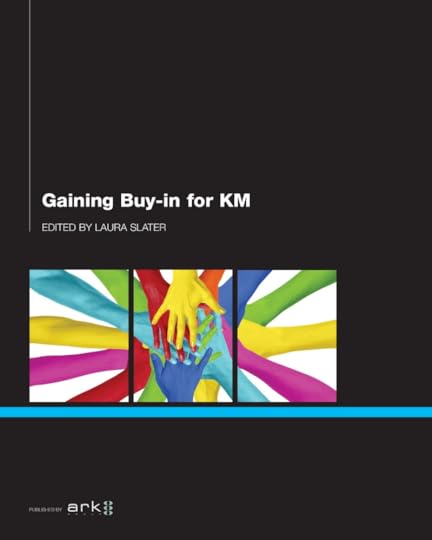 Knowledge Management Tools: Main Selection CriteriaKnowman collaborates in the creation of a guide for the selection of KM tools
Knowledge Management Tools: Main Selection CriteriaKnowman collaborates in the creation of a guide for the selection of KM tools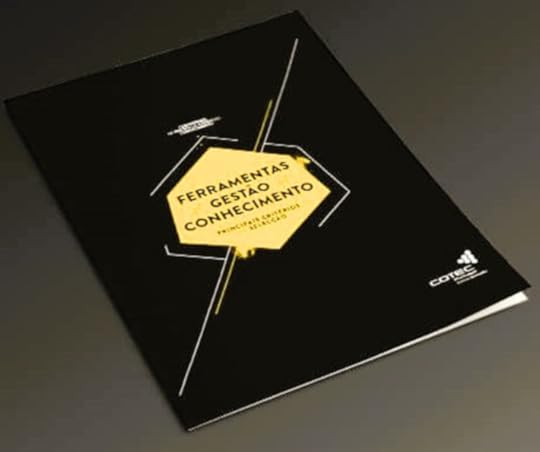 It Can Be Done: Knowledge Management and Innovation in the Public Sector
It Can Be Done: Knowledge Management and Innovation in the Public Sector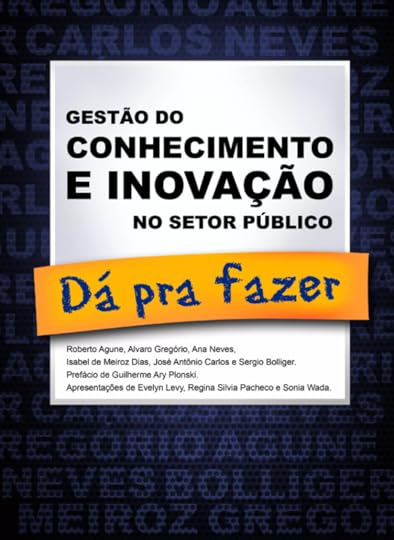 Profiles in Knowledge: 120 Thought Leaders in Knowledge management by Stan Garfield
Profiles in Knowledge: 120 Thought Leaders in Knowledge management by Stan Garfield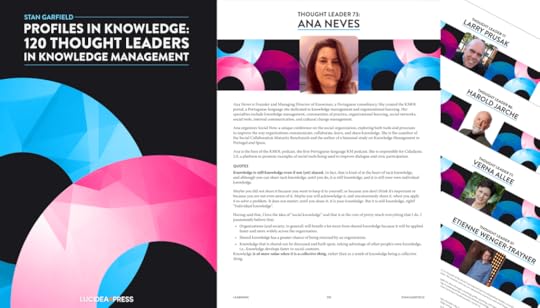 [image error]
[image error]



